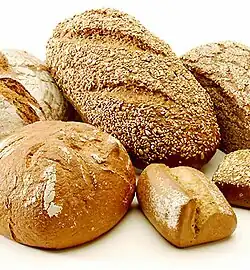pão
See also: Appendix:Variations of "pao"
Galician
References
- “pão” in Dicionário Estraviz de galego (2014).
Portuguese

Diversos pães - Various breads
Etymology
Inherited from Old Galician-Portuguese pan, from Latin pānem.
Compare Galician, Asturian, Leonese, and Spanish pan, Catalan pa, French pain, Italian pane, and Romanian pâine.
Pronunciation
- (Brazil) IPA(key): /ˈpɐ̃w̃/ [ˈpɐ̃ʊ̯̃]
- (Portugal) IPA(key): /ˈpɐ̃w̃/
- Rhymes: -ɐ̃w̃
- Hyphenation: pão
Noun
pão m (plural pães)
- bread
- (figuratively) food, sustenance
- (colloquial) an attractive or hot man
Quotations
For quotations using this term, see Citations:pão.
Derived terms
Descendants
- Guinea-Bissau Creole: pon
- Kabuverdianu: pom
- Korlai Creole Portuguese: pãw
- Kristang: pang
- Papiamentu: pan
- → Bengali: পাঁউ (pãu)
- ⇒ Bengali: পাঁউরুটি (pãuruṭi)
- → Burmese: ပေါင်မုန့် (paungmun.) (compounded with မုန့် (mun., “snack”))
- → Gujarati: પાઉં (pāũ)
- → Hindi: पाव (pāv)
- → Japanese: パン (pan)
- → Kadiwéu: paon
- → Korean: 빵 (ppang)[1]
- → Makalero: paun (“bread”)
- → Marathi: पाव (pāv)
- → Sinhalese: පාන් (pān)
- → Thai: ปัง (bpang)
- → Tetum: paun
References
This article is issued from Wiktionary. The text is licensed under Creative Commons - Attribution - Sharealike. Additional terms may apply for the media files.